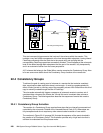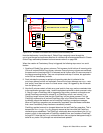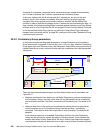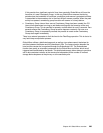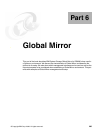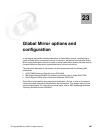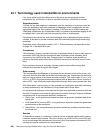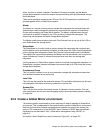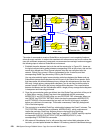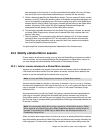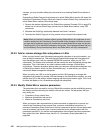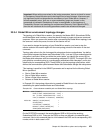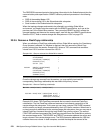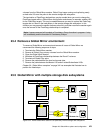268 IBM System Storage DS6000 Series: Copy Services with IBM System z
23.1 Terminology used in Global Mirror environments
First, let us review and further define some of the terms and new elements we have
presented so far, and that are of common use when working in a Global Mirror context.
Dependent writes
If the start of one write operation is dependent upon the completion of a previous write, the
writes are dependent. Application examples for dependent writes are databases with their
associated logging files. Also updates to catalogs, VTOCs as well as VSAM indexes and
VSAM data components rely on dependent writes. For instance, the database logging file will
be updated after a new entry has been successfully written to a table space.
Compliance at the remote site, with the chronological order of dependent writes to primary
volumes, is the basis to provide consistent data at the secondary site through remote copy
operations.
Dependent writes is discussed in detail in 13.3.1, “Data consistency and dependent writes”
on page 136, in the Metro Mirror part.
Consistency
The consistency of data is ensured if the order of dependent writes to disks or disk groups is
maintained. With Copy Services solutions the data consistency at the secondary site is
important for the usability of the data. Consistent data, for instance, gives the ability to
perform a data base restart rather than a data base recovery that could take hours or even
days.
Data consistency across all secondary volumes spread across multiple storage disk
subsystems is essential for logical data integrity.
Data currency
This term describes the difference of time since the last data was written at the primary site,
versus the time the same data was written to the secondary site. It determines the amount of
data you have to recover at the remote site after a disaster. This is also called
recovery point
objective
or RPO. Only synchronous copy solutions such as Metro Mirror have a currency of
zero or RPO = zero. All asynchronous copy solutions have a data currency greater than zero.
With Global Mirror a data currency of a few seconds can be achieved, while data consistency
is always maintained by the Consistency Group process within Global Mirror.
For asynchronous replication, this means that the data is not replicated at the same time that
the local I/O happens, but the data is replicated with a certain time lag. Examples of different
nonsynchronous or asynchronous replication methods are:
Global Copy - a non-synchronous method that does not guarantee consistent data at the
remote site.
z/OS Global Mirror (formerly XRC) - an asynchronous replication method that guarantees
consistent data at the remote site.
Global Mirror - also an asynchronous replication method that provides consistent data at
the remote site.
Session
A Global Mirror session is a collection of volumes that are managed together when creating
consistent copies of data volumes. This set of volumes can reside in one or more LSSs and
one or more storage disk subsystems at the primary site. Open systems volumes and z/OS
volumes can both be members of the same session.



